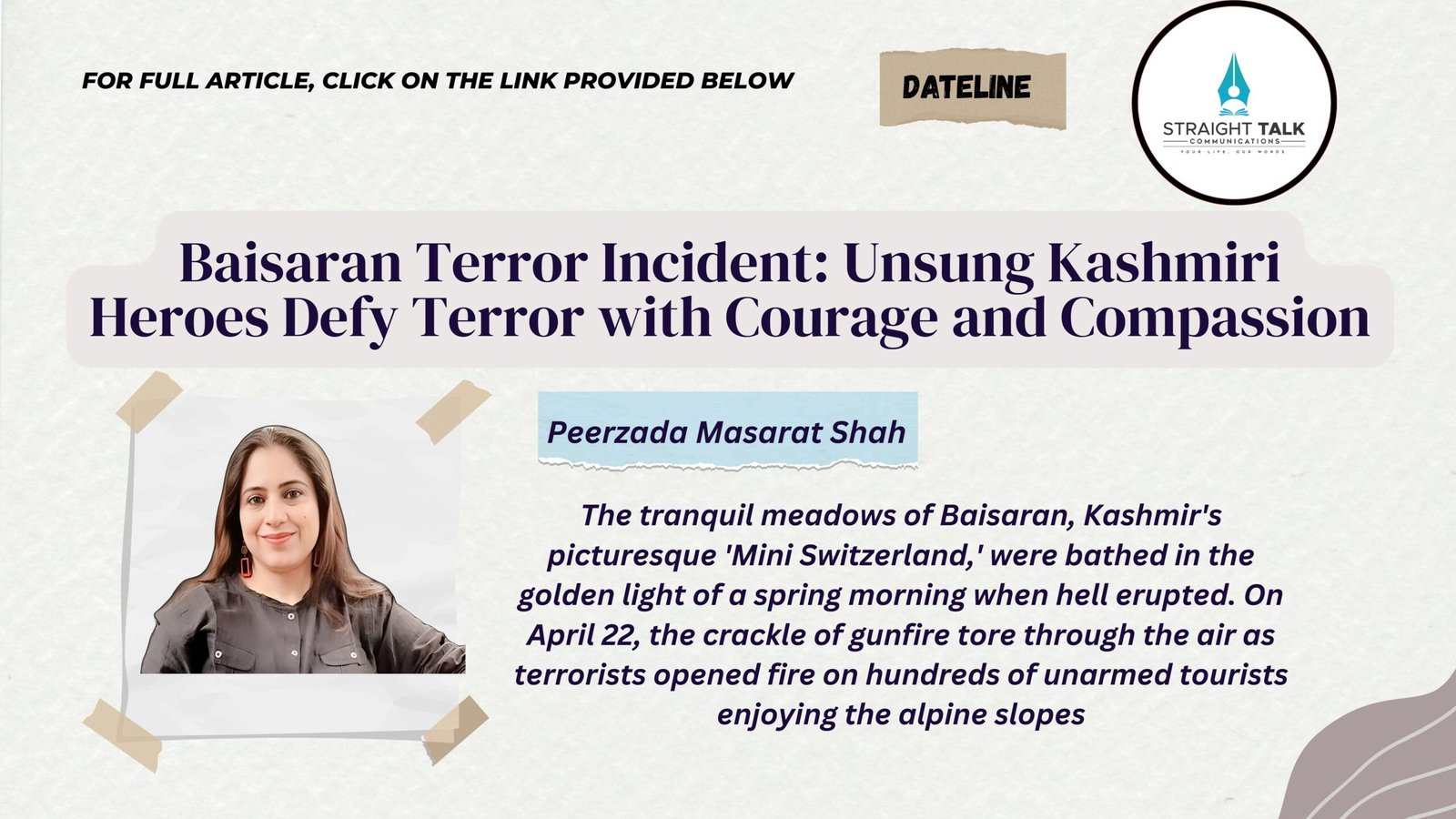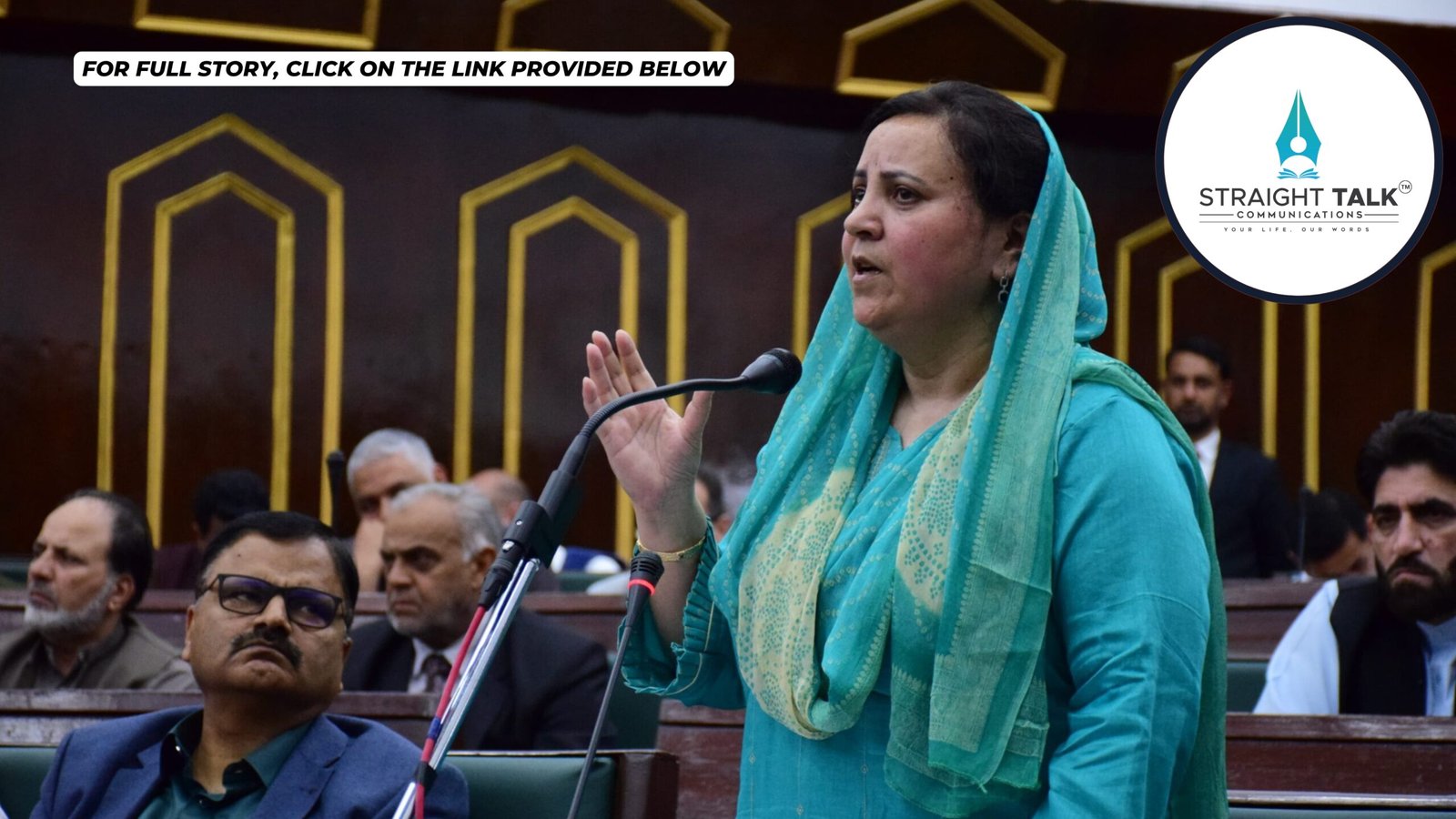Baisaran Terror Incident: Unsung Kashmiri Heroes Defy Terror with Courage and Compassion

Peerzada Masarat Shah
The tranquil meadows of Baisaran, Kashmir’s picturesque ‘Mini Switzerland,’ were bathed in the golden light of a spring morning when hell erupted. On April 22, the crackle of gunfire tore through the air as terrorists opened fire on hundreds of unarmed tourists enjoying the alpine slopes. Within minutes, 26 lives were extinguished, scores lay wounded, and the idyllic landscape became a killing field. Yet amid the horror, something extraordinary happened—ordinary Kashmiris rose with breathtaking courage, proving that when humanity is tested, it transcends all barriers of faith, fear, and factionalism.
At the center of this tragedy stands the story of Aadil Hussain Shah, a 28-year-old pony handler from the quiet village of Hapatnar. Like every morning, Aadil had woken before dawn, guiding his horse to the Circuit Road where tourists waited for their journey through Pahalgam’s pine-covered trails. He earned just ₹300 a day, but to him, it was more than a wage—it was dignity, a chance to share the beauty of his homeland with visitors. When the gunfire began, chaos erupted. Families scrambled for cover, children screamed, and the meadow that moments before had echoed with laughter became a scene of terror. But while others ran for safety, Aadil ran toward the gunmen. Eyewitnesses say he dragged two wounded tourists behind a rock, shielding them with his body before bullets cut him down. He died as he had lived—protecting others. His father, tears streaming down his weathered face, whispered, “Fakr hai uski shahadat par”—I am proud of his martyrdom.
Aadil was not alone in his heroism. Across the meadow, ordinary Kashmiris became saviors. Sajad Ahmad Bhat, a shawl vendor, was captured on video carrying an injured tourist on his back, stumbling over rough terrain to reach safety. When asked why he risked his life, his answer was simple: “These tourists are our guests. Humanity comes before religion.” Nearby, Irshad Ahmad, an ATV operator, loaded the wounded onto his vehicle, racing against time to get them to ambulances. Among them was Lt. Vinay Narwal, a Navy officer whose pulse had already faded. “I checked his wrist and knew he was gone,” Irshad said later, voice breaking. “But I couldn’t tell his wife. I lied and said he would be okay. What else could I do?”
The aftermath was a tapestry of grief and resilience. In one corner of the meadow, a seven-year-old boy who had been collecting pinecones for a school project sat in stunned silence, his small hands stained with dirt and blood. Nearby, Shubham Dwivedi, a 31-year-old from Kanpur who had just married in February, lay motionless, his family’s cries piercing the air. Dinesh Mirania from Raipur had been celebrating his wedding anniversary with his wife and children when the bullets found him. Each life lost carried a universe of dreams, love, and unfinished stories.
The economic toll was just as devastating. Hotels emptied overnight, thousands of bookings canceled. A local chef who had served tourists for three decades stared blankly at his empty kitchen. “This season was our hope,” he murmured. “Now, it’s not just money lost—it’s trust.” The attack was designed not just to kill, but to fracture—to drive a wedge between communities and strangle Kashmir’s fragile recovery. Yet the response defied this calculus. Across the valley, shops shuttered in mourning, not by decree, but in a spontaneous act of solidarity. Political rivals—Mehbooba Mufti, Omar Abdullah, and leaders in New Delhi—spoke in one voice to condemn the violence. Union Home Minister Amit Shah flew to Srinagar, vowing justice, while Prime Minister Narendra Modi convened emergency security meetings.
But beyond the politics and policies, the real story was written by people like Aadil, Sajad, and Irshad—ordinary men who became extraordinary in the face of terror. Their actions screamed a truth that no bullet can silence: terrorism has no religion, but humanity does. It is the thread that binds us, the light that outlasts even the darkest storms.
As investigations continue and Kashmir grapples with the scars of this atrocity, one thing is certain—the legacy of these heroes will endure. Aadil Hussain Shah will never again walk the trails of Pahalgam, but in the whispers of the pine trees and the laughter of future tourists who return to these meadows, his spirit will live on. For in the end, the message of that terrible day was not one of division, but of unity. When the unthinkable happened, Kashmiris chose courage over fear, compassion over hatred, and life over death. And in doing so, they reminded the world that no act of terror can ever extinguish the indomitable human spirit.
Aadil gave his life so others could live. Kashmir—and all of India—will never forget.








Baisaran’s serene plateau bore witness to two faces of existence: the grim hand of terror and the quiet, defiant hand of compassion, as locals tended to the wounded souls left behind.